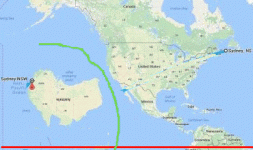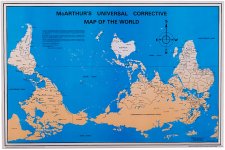Yesterday, we had the closest to perfect day so far this year. Warm day, low humidity and cool night. 81/56 F. Perfect day for a scenic rail trip.  Pittsburgh to New York City isn't steam but a nice trip including Horseshoe Curve. Even Cal would like it as there is a restaurant car.
Pittsburgh to New York City isn't steam but a nice trip including Horseshoe Curve. Even Cal would like it as there is a restaurant car. 
So in other words, south of the equator, July is your winter? Of course 'straya is a large enough island that you can probably effectively have two different seasons at the same time.
July there is your December. August may be colder (here Maine Feb and Mar can be brutal cold, not any balmy +4C.)
Relative to equator and poles, Australia runs about like from the middle of the US (hundreds of miles south of Victoria BC) down to the bottom of Mexico. So yeah the weather could be different; but note that at the moment the Bronx (NYC) and Mexico City are both 79F, while Maine is 77F and Victoria BC is 65-75F. Not really different "seasons".
Just 'cuz every body does it: attached are size-plots of Australia over the US and Canada. And a right-side-up map. Yeah, you expect different weather in Hudson's Bay and New Orleans, or above Baffin Is down to Windsor.
Flipping the map around the equator is not totally kosher. The UK is closer to the north pole than Maine yet south England rarely freezes in winter and just now they are whining about heat which is everyday in New Jersey. In happy times the Gulf Stream mixes most of a year's worth of heat/cold and washes it over the UK area, moderating extremes. At Maine the Gulf Stream gets caught in the notch above Cape Cod and mixes about 5 months of weather, so we may have a mild December and a cold April. I dunno the currents around Australia.
Attachments
Last edited:
Starting to cool off with day time highs ~26 and lows of 16-22 at night which is great to fan out the heat built up during the day. Very humid summer.
Had the first tomatoes today, sweet 100's are the first to come. Lots of cucumbers and beans for a few weeks now. Some carrots. We have been given some much needed rain, I needed a break from watering. Fire bans lifted.
Had the first tomatoes today, sweet 100's are the first to come. Lots of cucumbers and beans for a few weeks now. Some carrots. We have been given some much needed rain, I needed a break from watering. Fire bans lifted.
37C/98F expected tomorrow, with a RH of 60-65% and next to no wind : heat index of 127F/53C.
The sea side can be so lovely, but it looks I will be a still picture down to underwear in 12 hours from now.
Ouch!
It was hot and humid here and I was outside mixing concrete.
While I was cleaning the tools there was loads of thunder and just enough rain to make the ground spotty. It was nowhere enough to freshen things up.
We had enough rain to make the path wet later with only a little bit of thunder. It is still hot and sticky.
While I was cleaning the tools there was loads of thunder and just enough rain to make the ground spotty. It was nowhere enough to freshen things up.
We had enough rain to make the path wet later with only a little bit of thunder. It is still hot and sticky.
Drove some 500km to SE of Sweden. Temperature 25-30 inside and outside the car (no AC). But having the fan at 3/4 and windows perfectly adjusted I managed to cope with the heat and the wind noise.
On the other hand, I never have to pay 1000-1500 for a collapsed AC-equipment in my car.
On the other hand, I never have to pay 1000-1500 for a collapsed AC-equipment in my car.
With A/C in a car there is the extra fuel cost caused by drag on the engine to worry about.
Mythbusters tested fuel efficiency for windows rolled down and up and A/C on or off at highway speeds.
A/C on with windows up was more fuel efficient than windows down and A/C off.
Probably because the engine already has a few horsepower going to waste anyway just to crank the engine over and keep the car at highway speeds that the additional drag that an A/C compressor puts on the engine is of little to no consequence. AND because the condenser is already up the front of the engine bay causing drag weather its being used or not, so might as well use it anyway.
YouTube
In a modern car at highway speeds the aerodynamic drag increase from the open windows may burn more fuel that the AC compressor. I learned this from the owners manual in a Datsun / Nissan 280Z car in the 1970's. I can only imagine that the AC systems have improved since then and cars have become more aerodynamically slippery with the advancements in fancy computer modeling.
I have a most unslippery ugly square box car, the Honda Element. If I roll both windows down and hold the gas pedal at a steady 70 MPH on a flat road, then roll the windows up the speed will increase to 73 MPH. Punching the AC button brings me back to 70, but I assume that that may increase a bit after the AC system reaches equilibrium and starts cycling.
I have a most unslippery ugly square box car, the Honda Element. If I roll both windows down and hold the gas pedal at a steady 70 MPH on a flat road, then roll the windows up the speed will increase to 73 MPH. Punching the AC button brings me back to 70, but I assume that that may increase a bit after the AC system reaches equilibrium and starts cycling.
yeah exactly, the A/C compressor doesn't work all of the time either even on older cars and will use more power at higher engine RPMs, so if you are cruising along with an engine speed of 1,200-1,500rpm then it won't consume as much energy as an A/C compressor spinning at a higher RPM (if you are in a lower gear for example and doing 55 vs using an overdrive gear). and modern ones will increase and decrease their flow rate and allow the A/C compressor to be more efficientaccording to how much cooling is required.
YouTube
So with a variable displacement compressor the compressor is always turning, which just boggles the mind when you think about fuel effiency, if they drew any sort of amazing amount of power you would get terrible fuel consumption, yet you don't.
A good example in why you should look at the greater picture rather than just one component.
YouTube
So with a variable displacement compressor the compressor is always turning, which just boggles the mind when you think about fuel effiency, if they drew any sort of amazing amount of power you would get terrible fuel consumption, yet you don't.
A good example in why you should look at the greater picture rather than just one component.
Last edited:
Older cars used piston compressors that did consume considerable power. The 60's and early 70's Chryslers with the two cylinder V shaped compressor were the worst. There was a solenoid on the carburetor that increased the idle whenever the compressor was engaged to prevent engine stalling. GM used a swash plate to move 3 or 6 pistons over a shorter distance to increase efficiency.
Modern automotive compressors use a modified scroll or rotary design the is reasonably efficient. Computer control lets them use just what they need instead of freezing the occupants, then shutting off completely until it gets hot inside.
Modern automotive compressors use a modified scroll or rotary design the is reasonably efficient. Computer control lets them use just what they need instead of freezing the occupants, then shutting off completely until it gets hot inside.
Is that the same as a wobble plate?a swash plate
My 84 Dodge engine ran a Denso compressor. I never took one apart, but you barely knew it was running. Obviously an efficient design.
I went through a compressor clutch every year, sometimes less. One day I was experimenting with intercooler ducting and took the car to the racetrack without a hood on it. It was night time and I learned exactly why I fried AC clutches. The AC had been programmed to disengage whenever the gas pedal hit the floor. This allowed all of the engine's power to go to the wheels and afforded a tenth or two better MPG.
So the dumb blonde goes to the dragstrip, drops the hammer when the lights come down, disengaging the AC. I spin the engine to 7000 RPM and let off the throttle to grab second gear. The AC clutch immediately slams the AC compressor on while the engine is still spinning at just below 7000 RPM. A huge shower of sparks fly from the unhappy clutch. This repeats for 3rd and 4th gear, 5th was not needed in a quarter mile race.
Obviously this kind of operation was never envisioned by the programmers of Chrysler's 1st generation digital fuel injection even though my engine came from a "performance car." The dumb blonde solved the problem with a little PC board containing a relay and a 555 chip. Whenever the compressor clutch disengaged, keep it disengaged for at least 15 seconds. By that time I had won or lost the race! No more fried clutches.
I believe it is. Round plate that wobbles with rotation having 3 rods with one or two pistons each attached........
I went through a compressor clutch every year, sometimes less. One day I was experimenting with intercooler ducting and took the car to the racetrack without a hood on it. It was night time and I learned exactly why I fried AC clutches. The AC had been programmed to disengage whenever the gas pedal hit the floor. This allowed all of the engine's power to go to the wheels and afforded a tenth or two better MPG.
So the dumb blonde goes to the dragstrip, drops the hammer when the lights come down, disengaging the AC. I spin the engine to 7000 RPM and let off the throttle to grab second gear. The AC clutch immediately slams the AC compressor on while the engine is still spinning at just below 7000 RPM. A huge shower of sparks fly from the unhappy clutch. This repeats for 3rd and 4th gear, 5th was not needed in a quarter mile race.
Obviously this kind of operation was never envisioned by the programmers of Chrysler's 1st generation digital fuel injection even though my engine came from a "performance car." The dumb blonde solved the problem with a little PC board containing a relay and a 555 chip. Whenever the compressor clutch disengaged, keep it disengaged for at least 15 seconds. By that time I had won or lost the race! No more fried clutches.
I believe it is. Round plate that wobbles with rotation having 3 rods with one or two pistons each attached........
- Home
- Member Areas
- The Lounge
- The Weather




